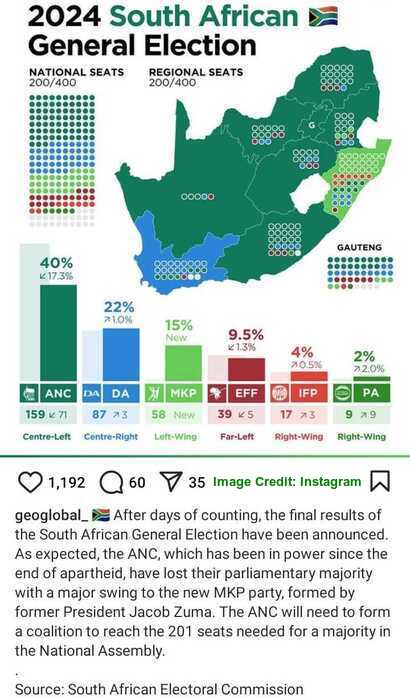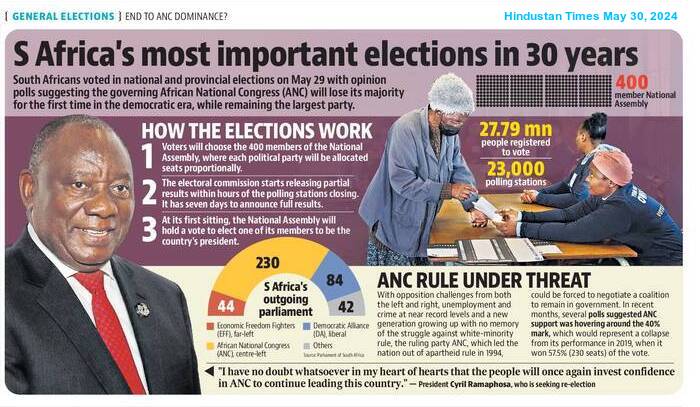The ‘Fall’ Of ANC!
The dominance of Nelson Rolihlahla Mandela‘s African National Congress (ANC) in South African politics has ended three decades after the end of the Apartheid Era. In a rare first, the ruling ANC has failed to win absolute majority in the National Assembly, marking a significant change in national politics. Although the ANC received the most votes with 40.18%, it would have to join hands with other parties to govern the country.
It became clear after the announcement of National Assembly Election results that although the ANC received 40.18% of votes, it failed to win 201 seats (required to form the government) in the 400-seat National Assembly. On the other hand, the second placed Democratic Alliance (DA) managed to bag 21% of total votes. Hence, the formation of a Coalition Government has become inevitable.

Meanwhile, former President and renegade ANC leader Jacob Gedleyihlekisa Zuma‘s uMkhonto we Sizwe Party (MKP) received 14% of votes and the Economic Freedom Fighters (EFF) got 9.52% of votes. Now, President Matamela Cyril Ramaphosa‘s ANC would have to form an alliance with the MKP or the EFF in order to stay in power. In the 2019 election, the ANC had received 57% of votes to secure 230 seats in the National Assembly.
After the results were declared, President Ramaphosa stressed: “What this election has made plain is that the people of South Africa expect their leaders to work together to meet their needs.” The DA’s John Steenhuisen referred to a potential ANC-EFF-MKP alliance as a “doomsday coalition“, stating that his party was open for negotiations. However, the DA fundamentally opposes the key policies of the ANC, such as Black Economic Empowerment and the National Health Insurance Bill. The MKP, too, expressed openness to talks with the ANC on the condition of Ramaphosa’s removal from the party, an outcome deemed unlikely by ANC Secretary General Nomvula Mokonyane.
Okay Africa reported that the EFF, which finished fourth with 9.52% of votes, had stated in April 2024 that it would join an ANC-led Coalition if granted control of the Finance Ministry. Following the announcement of the results, the newly-elected National Assembly must meet within 14 days to vote for the President.

It may be noted that the ANC had come to power in 1994 with a landslide victory in South Africa’s first democratic elections after the end of Apartheid Colonial Rule. Since then, the ANC has been ruling South Africa. However, the popularity of the party has decreased gradually in the last three decades. Despite emerging as the single largest party in the National Assembly, the ANC’s dominance has ended in South Africa this time. The Independent Electoral Commission (IEC) has revealed that a total of 16,290,156 peoplw cast their votes in 2024, resulting in a 58.64% turnout.
Boundless Ocean of Politics on Facebook
Boundless Ocean of Politics on Twitter
Boundless Ocean of Politics on Linkedin
Contact: kousdas@gmail.com

